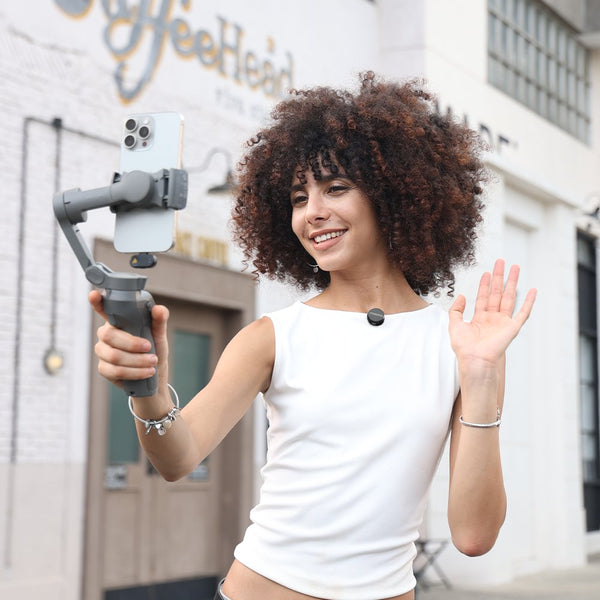Choosing the right microphone for recording music is crucial for achieving high-quality sound. Whether you're a vocalist, instrumentalist, or podcaster, there is a microphone you can use, to significantly impact your recordings.
When selecting good microphones for recording music, it's essential to consider specifications such as mic type, frequency range, and polar pattern. These factors determine the mic's performance and suitability for different recording scenarios. We'll delve into the specifications, pros and cons, notable features, and suitable applications for each microphone. In this guide, it aims to help you find the best microphones for recording music, covering a range of options from budget-friendly picks to more advanced models.
Specifications to Look for When Choosing a Mic:
Audio equipment and microphone manufacturers have diversified their product offerings to provide a great experience for consumers. Here are the specifications to consider when narrowing down your choices in the search for the best microphone for your specific needs:
Good Microphones for Recording
- Shure SM57
- Mic Type: Dynamic
- Frequency Range: 40 Hz - 15 kHz
- Polar Pattern: Cardioid
- Notable Features: Durable construction, versatile usage
- Pros: Reliable, affordable, widely used
- Cons: Limited frequency range for some vocals
- Application: Suitable for instruments, particularly guitars and drums, and some vocals
- Description: The Shure SM57 is a classic microphone known for its ruggedness and versatility. It's a favorite among musicians for capturing instrument sounds with clarity and precision.
- Audio-Technica AT2020
- Mic Type: Condenser
- Frequency Range: 20 Hz - 20 kHz
- Polar Pattern: Cardioid
- Notable Features: High SPL handling, low-mass diaphragm
- Pros: Affordable, great sound quality
- Cons: Requires phantom power, less durable than dynamic mics
- Application: Ideal for vocals and instruments
- Description: The AT2020 is a popular choice for home studios, offering excellent sound quality and reliability at an affordable price. It's suitable for a wide range of recording applications.
- Maono PM500

- Mic Type: Condenser
- Frequency Range: 20 Hz - 20 kHz
- Polar Pattern: Cardioid
- Notable Features: High SPL handling, low self-noise, large diaphragm
- Pros: Clear and detailed sound, sturdy build, versatile for various applications
- Cons: Requires phantom power, may pick up ambient noise
- Application: Suitable for vocals, instruments, podcasts, and streaming
- Description: The Maono PM500 is designed for studio-quality recordings. Its large diaphragm condenser capsule ensures accurate audio capture with detail, clarity, and pleasing sound. The cardioid polar pattern helps isolate the sound source, making it ideal for vocal and instrumental recordings. This microphone is a great choice for home studios and professional environments, offering high performance at an affordable price.
- Price: Approx. $149.99

- Mic Type: Condenser
- Frequency Range: 20 Hz - 20 kHz
- Polar Pattern: Cardioid
- Notable Features: USB connectivity, built-in volume control, mute button
- Pros: Plug-and-play setup, user-friendly controls, clear audio quality
- Cons: Limited to USB connectivity, may not be as robust as XLR mics
- Application: Ideal for podcasting, streaming, music recording (vocals and instruments) and voice-over work
- Description: The Maono PM422 is a USB condenser microphone that offers ease of use and high-quality sound. Its plug-and-play functionality makes it accessible for beginners and convenient for quick setups. The built-in volume control and mute button provide added control during recordings. This microphone is perfect for podcasters and streamers looking for a reliable and straightforward recording solution.
- Price: Approx. $69.99
Good Mics for More than $100
- Lewitt Pure Tube
- Mic Type: Condenser
- Frequency Range: 20 Hz - 20 kHz
- Polar Pattern: Cardioid
- Notable Features: Pure tube sound, premium build
- Pros: Rich, warm sound; high-quality build
- Cons: Expensive, requires careful handling
- Application: Best for vocals and high-quality instrument recordings
- Description: The Lewitt Pure Tube microphone offers a rich, warm sound that's perfect for professional vocal recordings. Its premium build ensures durability and reliability in any studio setting.
- Slate Digital VMS
- Mic Type: Condenser
- Frequency Range: 20 Hz - 20 kHz
- Polar Pattern: Cardioid
- Notable Features: Virtual microphone system, versatile modeling
- Pros: Highly versatile, excellent sound modeling
- Cons: Requires software, steep learning curve
- Application: Suitable for vocals and instruments, versatile studio use
- Description: The Slate Digital VMS is a revolutionary microphone that uses software to emulate the sound of various classic mics. It's perfect for studios that need a wide range of sounds without investing in multiple microphones.
- JZ Microphones Vintage V12
- Mic Type: Condenser
- Frequency Range: 20 Hz - 20 kHz
- Polar Pattern: Cardioid
- Notable Features: Vintage sound, unique capsule design
- Pros: Exceptional sound quality, unique vintage tone
- Cons: Expensive, specialized use
- Application: Ideal for vocals, particularly vintage-styled recordings
- Description: The JZ Microphones Vintage V12 is designed to deliver a vintage sound with modern reliability. Its unique capsule design captures rich, detailed audio, making it ideal for vocal recordings that require a classic touch.
Notable Microphones to Mention:
- Sontronics Solo Microphone
- IK Multimedia iRig Stream Mic Pro
- Sennheiser e 609 Silver
- Rode NT1 - Signature best mic for recording vocals
- Audio-Technica AE2300 Microphone
- Shure MV7
- Aston Microphones Origin
- AKG C214
- sE Electronics sE2200a II Microphone
- Shure SM7B - Durable build quality, super noise rejection
- Electro-Voice RE20
- AKG C636
- Neumann TLM 102 Microphone
- Rode NTR Ribbon Microphone
- Lewitt Pure Tube
- Telefunken TF11 FET
- Slate Digital VMS
- Sontronics Aria Microphone
- Audio-Technica AT5040 Microphone
- JZ Microphones Vintage V12
- AKG C414 XLII - for recording vocals
- AKG C214 - Best budget vocal mic
- Shure SM58
FAQs
What's the difference between valve and FET microphones?
Valve (tube) microphones use vacuum tubes to amplify the signal, offering a warm, vintage sound. FET (Field Effect Transistor) microphones use transistors for amplification, providing a cleaner, more modern sound.
What's a good recording microphone for starters?
The Audio-Technica AT2020 is an excellent choice for beginners due to its affordability and high-quality sound. Alternatively, the Maono PM422 and PM500 are high-quality microphones with special features for their price point—very budget-friendly
What are good headphones and microphones to buy for not just recording but more hearing yourself while singing?
The Shure SM7B paired with high-quality studio headphones like the Audio-Technica ATH-M50x is a great combination for recording and monitoring vocals.
What's a good yet affordable microphone for recording vocals?
The Audio-Technica AT2020, Maono PM500, and PM422 are reliable microphones for recording music and they offer excellent value and performance for vocal recordings.
What is a good microphone for both recording instruments and day-to-day voice chat?
The Shure SM57 is versatile enough for recording instruments and handling voice chats.
How to set up microphones for recording guitar lessons?
Position a condenser microphone like the Audio-Technica AT2020 near the sound hole of the guitar for a balanced sound. Use a pop filter to reduce unwanted noise and adjust the placement for the best audio quality.
Conclusion
The best microphone for recording music is the device that meets your requirements. If you are going to stream or record in a soundproofed room, a condenser microphone is ideal. However, if you’re using a mic in an untreated room, a dynamic microphone is a better option.
Finding the right microphone for your intended use, like recording music or streaming, can significantly enhance your sound quality. From budget-friendly options like the Shure SM57, Audio-Technica AT2020, Maono PM500, and Maono PM422 to more advanced models like the Lewitt Pure Tube and Slate Digital VMS, there's a microphone to suit every need and budget.
If you’re a beginner or a budding musician, consider good cheap mics for recording music that offers excellent audio quality. Take into account your specific requirements, whether for vocals, instruments, a combination of both, or content creation and choose a microphone that best fits your recording style. Happy recording!



